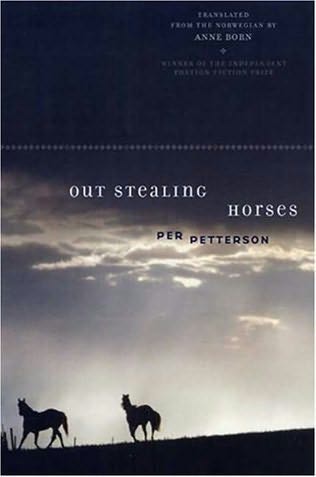Out Stealing Horses, Per Petterson
 I must confess I find a certain rather inexplicable poignancy in the process of aging and, more directly, the depiction of this process in fiction and poetry, particularly if it's done with a sense of grave restraint and slow loss that draws near but does not touch nostalgia. John Banville's The Sea was a revelation to me; Bellow's Herzog even more so. Henry Perowne of McEwan's Saturday is perhaps one of my favorite characters in a novel ever; Larkin's "High Windows" one of my favorite poems. I'm sure I will adore the new film Starting Out in the Evening and may even end up reading the book. I dislike Philip Roth, but I have reasons to dislike his particular take on the aging process.
I must confess I find a certain rather inexplicable poignancy in the process of aging and, more directly, the depiction of this process in fiction and poetry, particularly if it's done with a sense of grave restraint and slow loss that draws near but does not touch nostalgia. John Banville's The Sea was a revelation to me; Bellow's Herzog even more so. Henry Perowne of McEwan's Saturday is perhaps one of my favorite characters in a novel ever; Larkin's "High Windows" one of my favorite poems. I'm sure I will adore the new film Starting Out in the Evening and may even end up reading the book. I dislike Philip Roth, but I have reasons to dislike his particular take on the aging process.Per Petterson's most recent novel was billed as running very much in this poignantly geriatric vein, and, swayed by the raves it has received, I picked it up. I was disappointed.
I suppose I could lay my disappointment on the imbalance of recollection and present-tense narration. The narrator lives very little of the novel in the present tense, and his struggles with aging are mostly ones he anticipates and not ones he confronts. Well he does confront them—aches and unsteadinesses—, but the meanings he derives from them hang on what they will become—they are annoyances he senses will turn into debilitations, but for now his worries are theoretical.
However, I would argue that this is not just a problem for me and my odd tastes, but for the novel. The theoretical nature of his fears mean they will remain inert in the narrative and do not propel either reflection or action in any cohesive way. The novel's cohesion comes instead from a drama that is, in this case, rather static. The narrator's father left his family many years ago, and now the narrator has absconded into the backcountry of Norway—not far from a hideout he and his father shared a summer in—without the knowledge of his daughter. The novel is built on this simple logic—a single repetition of an escape or, alternatively, a single return replayed. This bifurcates the novel's material: there are memories of the narrator as a son, and there are his present actions as that son grown up, now also a father. The novel does not so much fuse or intertwine (except on a formal level) the two as it sets up a relay system such that a line is drawn from one thing in the past to one thing in the present to one thing in the past to maybe two things in a row from the past to... There is no ramification of memory, no wide turns nor regressions—and that is not memory. Memory is not a line, and neither is a good novel.
Out Stealing Horses is by no means bad, but its simplicity—which I do consider to be otherwise a virtue—is in this case detrimental to its development and its execution.
Comments